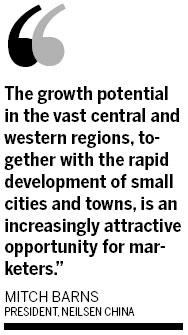
Customers look at sunglasses in a store in Shanghai. Price rises and stock market volatility were the two major factors affecting consumers' attitudes in the second quarter, particularly in first- and second-tier cities. [Kevin Lee / Bloomberg]
Urban consumers get jitters over price rises, stock market volatility
BEIJING - Consumer confidence in China's cities declined in the second quarter while their counterparts in the nation's vast rural areas were more upbeat, according to research conducted by the National Bureau of Statistics and the Nielsen Company.
According to the research, compared to the previous quarter, consumer confidence in first-tier cities fell 5 percentage points and 7 percentage points in second-tier cities.
Mitch Barns, Nielsen's president in China, said price rises and stock market volatility were the two major factors affecting consumer attitudes in the second quarter, particularly in first- and second-tier cities.
But the growing willingness of rural residents to spend meant China's overall consumer confidence index rose 1 percentage point between April and June, the fifth quarterly increase in a row.

Consumer confidence in China's rural areas increased 6 percentage points on the last quarter.
"That is mainly due to government policies to stimulate economic activities and increase incomes in rural areas during the first half of this year," said Pan Jiancheng, deputy director-general of the China Economic Monitoring and Analysis Center of the National Bureau of Statistics.
"Meanwhile, increased minimum wages for migrant workers in some parts of China have also brightened rural consumers' attitudes," he added.
For Barns, the continued increase in confidence in rural areas is a positive factor in this latest survey.
"The growth potential in the vast central and western regions, together with the rapid development of small cities and towns, is an increasingly attractive opportunity for marketers," said Barns.
But he believed the growth will bottom out or even drop in the next quarter.
Chinese consumers' biggest concerns remain unchanged from the last report, with income levels, health and education being the top three.
But food prices rose in the rankings from the previous quarter, moving from eighth to fifth place.
"The key to manage inflation expectations is to manage food prices," Pan said.
Food accounts for a third of China's consumer price index, which rose 3.3 percent in the year to July, up from 2.9 percent in the 12 months to June.
According the report, 70 percent of Chinese consumers expect an overall price increase in the next 12 months, up two percentage points compared with the previous last quarter.
But only 28 percent of Chinese consumers expect automobile prices to increase, while another 41 percent expect automobile prices to fall.
Due to the government's intensified efforts to cool the property sector in key cities since April, respondents in major cities expecting property prices to fall outnumbered those anticipating a further rise, the survey found.
A total of 36 percent of consumers in first-tier cities expected real estate prices to increase - down 24 percentage points on the previous quarter.





